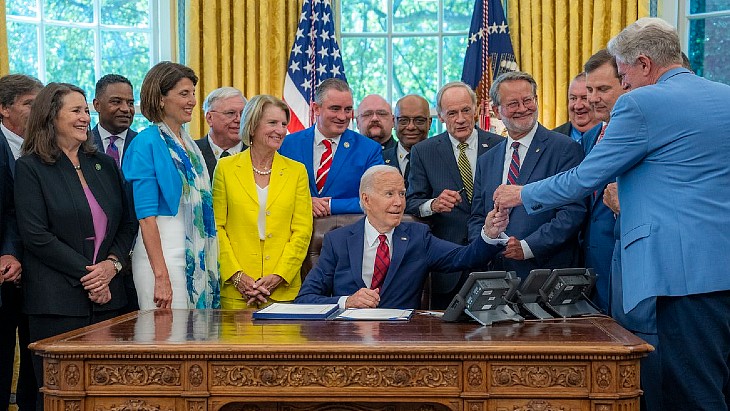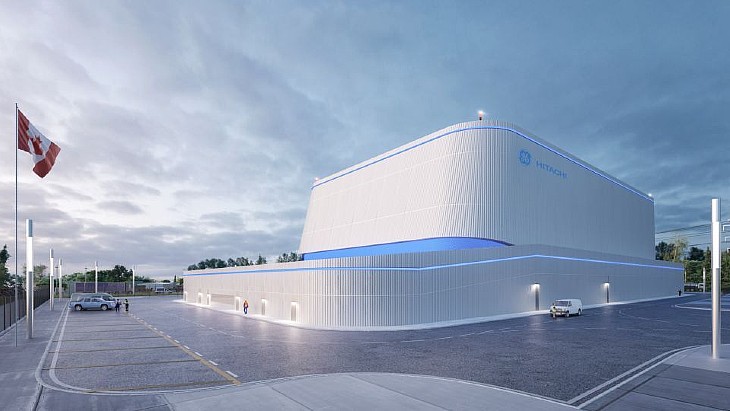FANR, Khalifa University sign collaboration agreement
.jpg)
Through the agreement, FANR and Khalifa University will continue their joint work on the Advanced Thermal-hydraulic Test Loop for Accident Simulation Project Phase 2 (ATLAS-2).
This is a project led by the OECD Nuclear Energy Agency which focuses on addressing thermal-hydraulic safety and accident management issues in light water reactors. It is a follow-up to the ATLAS project carried out between April 2014 and March 2017 by the Korea Atomic Energy Research Institute. The project - with a budget of EUR3.0 million (USD3.5 million) - is supported by the safety organisations and industry in the following countries: Belgium, Czech Republic, China, France, Germany, South Korea, Spain, Switzerland, UAE and USA. It will run from October 2017 to September 2020.
Following the signing of the collaborative research agreement, FANR and Khalifa University will prepare to present their collective research findings on one of the relevant tests at the ATLAS-2 Project Review Meeting to be held next month in South Korea.
Viktorsson said, "Since FANR's establishment in 2009 we have prioritised human capacity development in nuclear safety. Through this research agreement, Emirati students and researchers will learn about the critical safety features of nuclear systems utilising various coding systems, including how to generate and modify plant inputs and study test results. Likewise, the training material produced by our work on the ATLAS-2 project will serve as a valuable resource to post-graduate students and researchers for years to come."
Al Hammadi added: "The sponsored research and collaboration agreement with FANR will enable us to undertake research into thermal hydraulic studies as part of the ATLAS-2 project. This collaboration is in line with Abu Dhabi Economic Vision 2030, which emphasises the importance of sustainability of energy and water. It also concurs with Khalifa University's mandate which includes education, research and advancement of knowledge. Through this agreement, we believe, we will be contributing effectively to fostering local expertise on nuclear safety in the UAE and to produce comprehensive training material for future safety analysis."
Enhanced cooperation with MOCCAE
Meanwhile, FANR has also signed a memorandum of understanding (MoU) with the UAE's Ministry of Climate Change and Environment (MOCCAE) to strengthen their cooperation.
.jpg.aspx) The signing of the MoU by FANR's Viktorsson and His Excellency Sultan Alwan (Image: FANR)
The signing of the MoU by FANR's Viktorsson and His Excellency Sultan Alwan (Image: FANR)
According to the agreement, MOCCAE and FANR will strengthen cooperation in various scientific, training and vocational areas, in addition to exchanging expertise. It also involves boosting cooperation in research areas, as well as preparing and developing legislation and regulations related to radioactive material in the environment. It also covers future cooperation in the assessment of the rate and measurement of radioactive material concentrations in natural resources.
His Excellency Sultan Alwan, assistant undersecretary of the regions sector at MOCCAE, noted the signing of the MoU with FANR falls within the framework of cooperation with various federal government entities in fields related to climate change and the environment.
Viktorsson said: "Since FANR's establishment in 2009 our mandate has been clear: to protect the people and the environment from nuclear and radiation hazards. Signing the MoU with the Ministry of Climate Change and Environment marks a milestone that will strengthen the cooperation between the two parties, thereby enhancing the protection of the people and the environment in the UAE."
Four Korean-designed APR-1400 units are being built for the Emirates Nuclear Energy Corporation (ENEC) at Barakah, in the Dhafrah region of Abu Dhabi, by a consortium led by the Korea Electric Power Corporation. Barakah 1 was formally declared complete in March and is waiting to receive an operating licence from the UAE's Federal Authority for Nuclear Regulation before fuel loading and operation can begin. ENEC on 6 August announced the completion of hot functional tests at Barakah 2. Overall, construction of the four units is now over 89% complete.










_88592.jpg)

